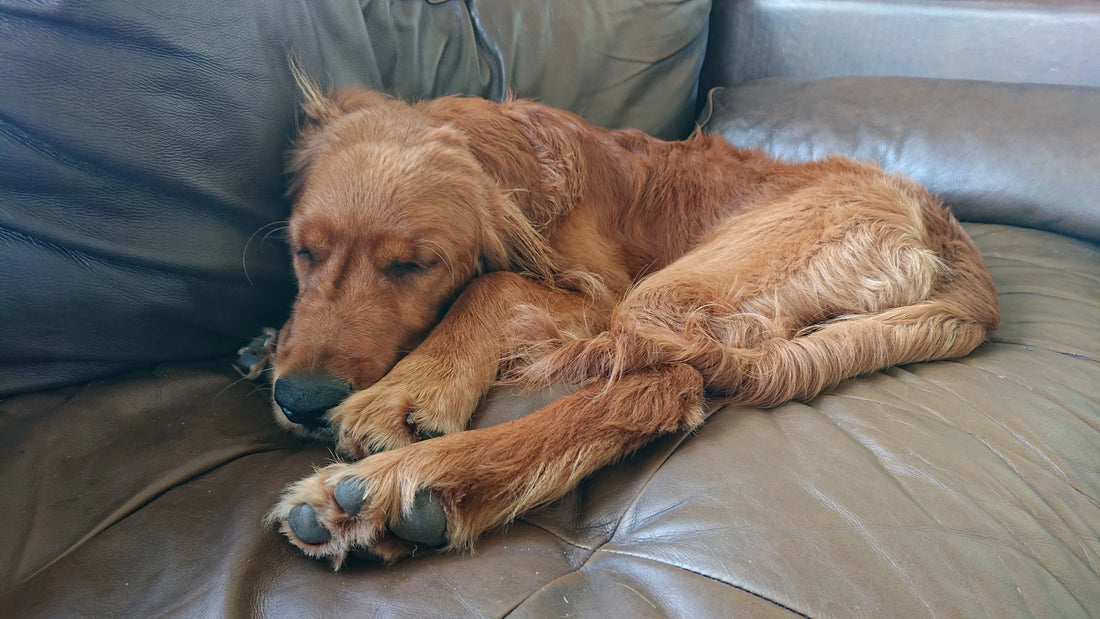
Why do puppies sleep so much?
Share
Why Puppy Sleep Is So Important for Learning and Development
Sleeping lets them build memories and remember their training.
Rufus and Louie are a few years on from puppyhood but it’s still cute to think back to when they were, especially curled up asleep on us, they are way too big for that now. They did a lot of napping, that’s for sure and it turns out those sleeps are essential for their development.
Just like human babies, puppies need plenty of sleep to process what they’ve learned and strengthen their growing brains. Science tells us that while they snooze, they’re consolidating memories and making sense of everything they’ve experienced while awake.
Why is sleep so important for puppies?
Puppies, like humans, go through phases of deep sleep that are vital for brain development. During sleep, their brains are hard at work, sorting through the events of the day and locking in new information. This process, known as memory consolidation, helps puppies remember things they’ve learned, like basic commands, social interactions and toilet training.
A study conducted by researchers at the Family Dog Project in Hungary found that dogs consolidate memories during sleep in a way similar to us. In the study, dogs that took a nap after learning a new task performed better than those that stayed awake. The researchers concluded that sleep plays a key role in helping dogs retain new information and apply it in future situations. For puppies, who are constantly absorbing new experiences this makes napping even more critical.
How does sleep help puppies learn?
When puppies sleep, their brains replay the activities and experiences they’ve had during the day. This replay helps them:
- Strengthen memory: Important lessons, like learning to sit on command or responding to their name, are reinforced during sleep. Without enough rest, they may struggle to retain these new skills.
- Process emotions: Sleep helps puppies manage the emotional ups and downs of their day. Whether they’ve had a positive interaction with a new dog or felt unsure in a new environment, sleep gives them the time they need to process these emotions and reset.
- Boost problem-solving skills: Just like humans, puppies who get enough sleep are better at problem-solving. If you’re working on crate training or recall, a well-rested puppy is more likely to succeed.
In essence, sleep is when the magic happens, it’s the time when everything they’ve learned comes together, preparing them to tackle the next day with confidence.
How much sleep do puppies need?
Puppies are little bundles of energy, but they also tire out quickly. On average, puppies need 18–20 hours of sleep per day. This might sound like a lot, but their bodies and brains are growing at an incredible rate, which requires plenty of rest.
Here’s a breakdown of a typical puppy’s day:
- Active play or training: Short bursts of activity, such as playing fetch, learning a new trick or socialising with other dogs.
- Naps: Puppies need frequent naps throughout the day to recover and consolidate what they’ve learned.
- Night-time sleep: Most puppies sleep through the night, but they’ll still need plenty of downtime during the day to stay happy and healthy.
As they grow older, their sleep needs will decrease slightly but even adult dogs require around 12–14 hours of sleep a day to stay in top form.
How to create the perfect nap environment
To help your puppy get the most out of their naps, it’s important to create a calm, comfortable space where they can rest without interruptions. Here are a few tips:
- Provide a cosy bed – A soft, supportive bed in a quiet area of the house is ideal for naptime. Make sure it’s away from noisy distractions, like the TV or busy hallways.
- Stick to a routine – Puppies thrive on routine, so try to establish consistent times for play, meals and rest. This helps them know when it’s time to wind down.
- Avoid overstimulation – Too much excitement before naptime can make it harder for your puppy to settle down. Keep play sessions short and end them with a calm activity or cuddle.
- Let them sleep undisturbed – It can be tempting to cuddle or play with your puppy while they’re sleeping, but it’s important to let them rest. Disturbing their sleep can disrupt the memory consolidation process.
Signs your puppy needs a nap
Just like toddlers, puppies can become cranky and overexcited when they’re overtired. Look out for these signs that it’s time for a nap:
- Excessive biting or chewing
- Zoomies or frantic running
- Barking or whining without a clear reason
- Difficulty focusing during training sessions
- Lying down in the middle of play
If you notice these behaviours, it’s a good idea to guide your puppy to their bed for some much-needed rest.
If you love learning how dogs think and thrive, explore our range of all-natural supplements designed to support your dog’s long-term health and happiness. Shop all supplements.
